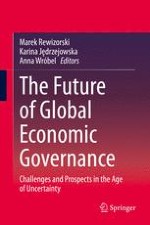2020 | OriginalPaper | Buchkapitel
Networks Decentralizing Authority in Global Economic Governance
verfasst von : Jonathan Luckhurst
Erschienen in: The Future of Global Economic Governance
Verlag: Springer International Publishing
Aktivieren Sie unsere intelligente Suche, um passende Fachinhalte oder Patente zu finden.
Wählen Sie Textabschnitte aus um mit Künstlicher Intelligenz passenden Patente zu finden. powered by
Markieren Sie Textabschnitte, um KI-gestützt weitere passende Inhalte zu finden. powered by
